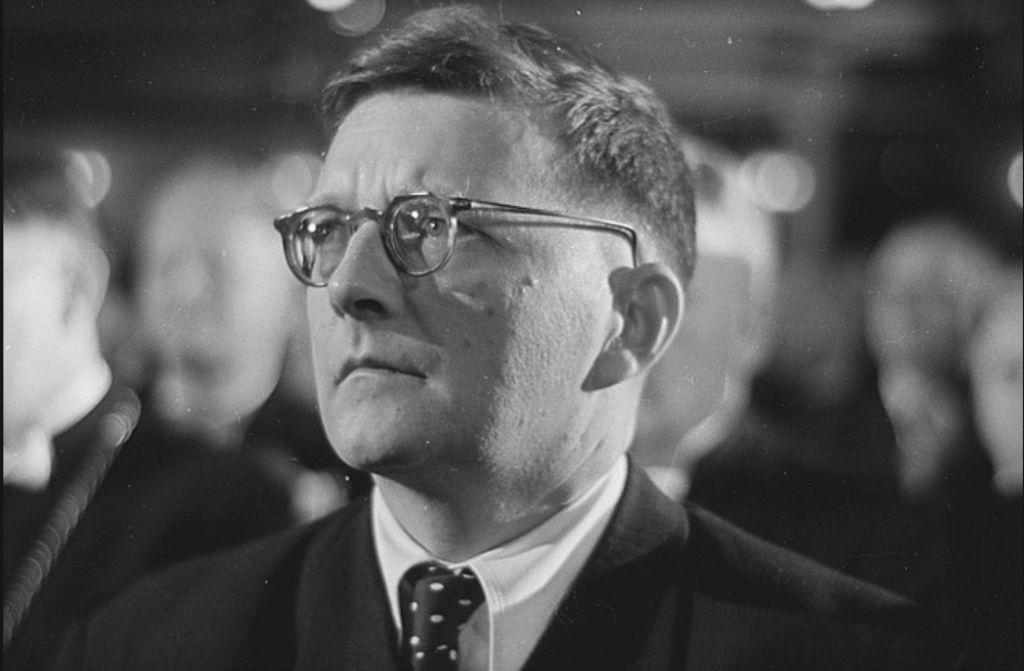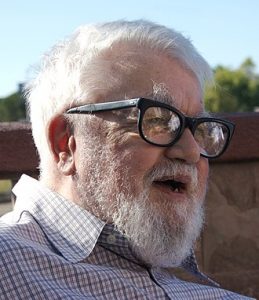What really happened on December 11, 1936 will forever be a mystery to the music world. At the height of Soviet oppression of the arts, Dmitri Shostakovich, a very influential composer in the early twentieth century, took a strong stance against the Soviet Union and Joseph Stalin’s rule. He used his music to speak his mind, and it was rumored that his 4th Symphony would be his loudest, most ambitious piece that he had ever composed. The symphony even called for over one-hundred instruments.1 However, on the day of its debut, Shostakovich abruptly cancelled it. The symphony would not be performed for over two decades. But given how significant the piece was to him, why did Shostakovich cancel it?
Shostakovich spent most of his life in the public eye. He was first introduced to music by his mother, who was a pianist. At eight years old, his mother put him in front of a piano and realized that he was gifted with perfect pitch and an impressive memory that allowed him to play exactly what she had taught him. At only thirteen years old, Shostakovich attended school at St. Petersburg Conservatory, where he started to write and compose music. He was nineteen when his first symphony debuted. It was a huge success and it kick started his music career. From that point on, Shostakovich had become famous.2

By 1931, Shostakovich had composed ballets, operas, film scores, orchestral pieces, and two new symphonies. His art was pure self expression and he was loved by the public. He had so many plans for his next compositions, and he even started to compose music for Lady MacBeth of Mtsensk, the famous Shakespearean tragedy that was being turned into an opera.3 Shostakovich dedicated the opera to his new bride, Nina, and he poured his heart into it.4 It took him several years to fully finish it because of how much sentiment it had for him. But little did he know, that in these years, his art would become completely restricted and even threatened by the Soviet Union.
The Soviet Union was notorious for censorship of the arts, and especially of self expression. In August of 1934, Joseph Stalin declared Socialist Realism as the only form of art that the Soviet Union condoned. Socialist Realism was an established form of art that promoted propaganda for the Soviet Union, and for the Communist Party’s ideals. Its art was described as artificial and narrow. It was ruthlessly enforced by the Soviet Union, and it was the start of a severe censorship of the arts.5 Unfortunately for Shostakovich, and for other Russian artists who did not agree with the Soviet regime and its Socialist Realism, it made them huge targets for Stalin. But that did not stop Shostakovich from finishing his work on Lady MacBeth of Mtsensk.
Lady MacBeth of Mtsensk was monumental. The opera was very progressive and focused on the defiance of a woman who wanted to be free from her marriage. It was interpreted that the opera was blurring social norms for women and music. It was described as vivacious, sexual, and highly creative. It was the complete opposite of Socialist Realism, and following its debut, it was an instant success. The public liked it so much, that it was performed over two-hundred times, and each performance filled over 90% of the theater’s capacity.6 Critics loved Lady MacBeth of Mtsensk and the work Shostakovich put into it. Some critics even said it was the best art that Russia had seen in over half a century. But Shostakovich soon faced the repercussions of a harsher critic. On January 26, 1936, Joseph Stalin and several highly ranked officials abruptly showed up to a performance of Lady MacBeth and left before the opera had even finished.7 It was a clear sign of turmoil. Two days after the performance, Russia’s official newspaper, Pravda, came out with the article “Muddle in Music,” that bashed Lady MacBeth of Mtsensk and more importantly, Shostakovich himself.8

Joseph Stalin took a personal interest in Shostakovich. Not even two weeks after “Muddle in Music” appeared, a new article from Pravda, “Balletic Falsity” bashed another piece Shostakovich had worked on. The end of the article displayed a chilling message. Saying “This is a game… that may end very badly.”9 This was a formal threat from Stalin to Shostakovich and it instilled fear in everyone that publicly endorsed Shostakovich. After this, Shostakovich kept a packed suitcase in front of his door; he feared that he would be arrested or even killed by Stalin and the secret police.10 After all of this, his career tanked. His own friends started to disassociate themselves from him because of their own fear of Stalin and what would happen to them if they continued their friendship and loyalty to him. This fear stemmed from The Great Purge, which was a campaign of political repression led by Joseph Stalin that resulted in over two million arrests, and over seven-hundred thousand executions from 1935 to 1938. These deaths were inflicted on anyone that opposed Stalin and his grip on power. Simply being friends with someone who opposed Stalin was reason enough for arrest.11 Shostakovich was not unscathed by Stalin’s purges. Many of his friends disappeared. While going through such panic, he turned to composing his 4th Symphony.
Shostakovich knew that his defiance of Socialist Realism had inspired many people. As a result, he was a huge target for Stalin’s thugs, and he knew that he had to stand against them. They took his career, his friends, his safety, and his freedom away from him. Although Stalin could take all of those things, he could never take away his passion and gift of composing music. Shostakovich started composing his 4th Symphony in September of 1935, just as the purges were starting up. He put it on hold when he started to work on Lady Macbeth. In February of 1936, Shostakovich was still dealing with the repercussions of Pravda’s articles. He knew that Stalin would have a close eye on what he would compose next. Despite knowing that, he continued to write the 4th Symphony. The symphony would be the loudest piece he would ever compose. Not only was the music itself loud, but the message was astonishing. He had gone through so much during the months leading up to the completion of the 4th, and he would forever be changed by it. Shostakovich planned to meet with Otto Klemperer, a Jewish composer, on May 30, 1936, to show him the 4th Symphony. In the early morning of May 30, Shostakovich’s wife gave birth to their daughter, Galina. After celebrating the birth of his first child, Shostakovich returned to performing the 4th Symphony for Klemperer and other acquaintances. They instantly loved it and Fritz Stiedry promised to perform it in Leningrad. Shostakovich was happy that they liked it, but he deeply feared the reality of what could happen after its debut.12

In the months leading up to the 4th Symphony’s debut, Shostakovich would “tremble with fright.”13 The date of debut was set for December 11, 1936. Having recently become a father, Shostakovich knew that he had a lot to lose. On the morning of December 11, Shostakovich abruptly cancelled the 4th Symphony. Rumors were everywhere. Isaak Gilkman, a friend of Shostakovich, recalled seeing the secretary of the Union Composers, V.E. Iokhelson, and an official from the headquarters of the city’s Communist Party apparatus come to rehearsal the morning of its debut. The director of the Philharmonic Orchestra I.M. Renzin, Shostakovich, and the two officials all went into a room together. It was only fifteen to twenty minutes before Shostakovich came out of the room, and in an expressionless tone, announced that he was cancelling his beloved 4th Symphony.14 The rumors were a plague. There were so many theories as to why Shostakovich cancelled it so close to its debut. The public followed the story, but unfortunately, no questions would be answered for decades.
What was said that morning of December 11, in that meeting, will forever be unclear. But it is clear that Shostakovich had a tremendous amount of pressure on him. The Soviet Union was oppressive and brutal during these times, and there was no doubt that fear of Stalin was a driving force in the cancellation of the 4th Symphony. In an interview in 1973, Shostakovich admitted, “I didn’t like the situation. Fear was all around. So I withdrew it.”15 Although the 4th Symphony was cancelled, it was revived and debuted in Moscow on December 30, 1961.16 The public waited twenty-five years to hear the “missing” symphony. After its revival, Shostakovich admitted that his 4th Symphony was the best thing he had ever written and that the symphony still remained dear to him after all of these years.17
“When a man is in despair, it means he still believes in something.” – Dmitri Shostakovich
- Laurel E. Fay, Shostakovich: A Life (New York: Oxford Press, 2000), 94. ↵
- Laurel E. Fay, Shostakovich: A Life (New York: Oxford Press, 2000), 9-10, 13-14, 32. ↵
- Laurel E. Fay, Shostakovich: A Life (New York: Oxford Press, 2000), 68-69. ↵
- Laurel E. Fay, Shostakovich: A Life (New York: Oxford Press, 2000), 69-70. ↵
- John Merriman and Jay Winter, Socialist Realism in Europe Since 1914 (Detroit: Charles Scribner’s Sons, 2006), 238, https://link.gale.com/apps/doc/CX3447000806/GVRL?u=txshracd2556&sid=GVRL&xid=46ab7ff9. ↵
- Laurel E. Fay, Shostakovich: A Life (New York: Oxford Press, 2000), 76-78. ↵
- Laurel E. Fay, Shostakovich: A Life (New York: Oxford Press, 2000), 83-84. ↵
- Ivan Martynov, Shostakovich: The Man and His Work (New York: Philophical Library Inc), 49-50. ↵
- Laurel E. Fay, Shostakovich: A Life (New York: Oxford Press, 2000), 85-86. ↵
- Gale eBooks, Contemporary Authors, New Revision Series: Shostakovich, Dmitri (Dmitievich), 1906-1975 (Detroit: Gale, 2003), 356-361 Vol. 117. ↵
- Hiroaki Kuromiya and Noah Berlatsky, Overview of the Great Purge (Detroit: Greenhaven Press, 2013),13-24, https://link.gale.com/apps/doc/CX2063900010/GVRL?u=txshracd2556&sid=GVRL&xid=fe1806fe. ↵
- Laurel E. Fay, Shostakovich: A Life (New York: Oxford Press, 2000), 92-96. ↵
- Laurel E. Fay, Shostakovich: A Life (New York: Oxford Press, 2000), 95. ↵
- Laurel E. Fay, Shostakovich: A Life (New York: Oxford Press, 2000), 95-96. ↵
- Laurel E. Fay, Shostakovich: A Life (New York: Oxford Press, 2000), 97. ↵
- Laurel E. Fay, Shostakovich: A Life (New York: Oxford Press, 2000), 226. ↵
- Laurel E. Fay, Shostakovich: A Life (New York: Oxford Press, 2000), 226-227. ↵




72 comments
Azucena Cuevas
This article was well-written and very informative. I enjoyed how detailed it was and the structure was well thought out. Shostakovich stood up for what he believed in and even though he lost his friends and was threatened he continued to do what he felt passionate about. It is insane that he was targeted by the Soviet Union, specifically by Joseph Stalin.
Sydney Hardeman
This was a very informative and interesting article. It did a great job of telling the story of how Dmitri Shostakovich was able to overcome the pressures from a time of tyranny and oppression among the people of the Soviet Union by Joseph Stalin and his regime. He stood up for what he believed in, whether that meant losing friends, being threatened, having symphonies cancelled, he never sacrificed his intuition.
Michael Thompson
This is a super interesting article. In an obviously oppressive time, it must’ve been hard for any artistic person, such as Shostakovich, to express their art. So it makes me wonder, what if artistic freedom was encouraged instead of discouraged. I wonder if it would have made more artists come out, and maybe that it is a lost generation of artists who didn’t express themselves out of fear. Or would it have made artists such as Shostakovich not as good, who didn’t have the adversity, which in some cases makes people stronger.
Jeremiah Durand
That was a great read and you really nailed the information. I have previously studied Shostakovitch and his writing and its very interesting how a medium of classical music could actually carry undertones of a political stance. His writing to this day influence the writings of many contemporary composers.
Rahni Hingoranee
This is a new composer for me. Shostakovich is very bold in taking a controversial stance in Soviet Russia and particularly one of the most horrendous dictators in history; Joseph Stalin. It is almost a death wish to do such a thing. I think the birth of his daughter is a reason he never released the 4th symphony to the public. At this point, he feared for those who he cared about which is a change.
Aaron Peters
Congrats on getting published Amanda. The story of Dmitri Shostakovitch is pretty fascinating, attempting to resist the oppressive regime of the Soviet Union in his own unique way. being under the pressure of the soviet secret police, as well as existing at the mercy of the murderous dictator Stalin must have been very tough. choosing to speak up against them must be tough to speak up despite all of that.
Briley Perkins
This article was very well written. It is amazing as to what Shostakovich accomplished despite the subtle threats from Stalin and the Soviet. It’s sad that a lot of his friends left him and did not associate themselves with him anymore, but it is understandable as they could have possibly been killed. I could not imagine living in fear that one day your life could change in the second just by one man.
Michael Lazcano
To see that such beauty can come out of somebody who is weighed down by external pressures is amazing! I could not imagine how it must have felt to be Shostakovich in a time of oppression, and fear. It was also very interesting to read that Stalin actively tried to discredit him and cancel the fourth symphony. I think that everyone has the right to express their creativity, and this article shows that we should always fight to do so.
Nicholas Robitille
This article was a very informational one. I hadn’t known about the struggle for art and life that the Russian people had to go through because of the socialist regime. This struggle was truly embodied in the story of this composer and the author of this article truly made it known. The story of this man’s fight for his beliefs and his bravery in the face of the tyranny of his government. I must admire both his bravery and how his reasoning for cancellation was not fear for himself but fear for his children.
Sabrina Doyon
Wow, this was an awesome article! The censorship of art in Soviet Russia sounds terrifying! I can’t believe that he attracted the negative attention of Stalin himself! Imagine working so hard to create beautiful music and everyone loving it but then having to flee in fear of your life! It is so sad that he had to cancel his 4th symphony when he worked so hard on it. I really enjoyed the flow of this article and story and the quote at the end was a very nice touch. Great job!